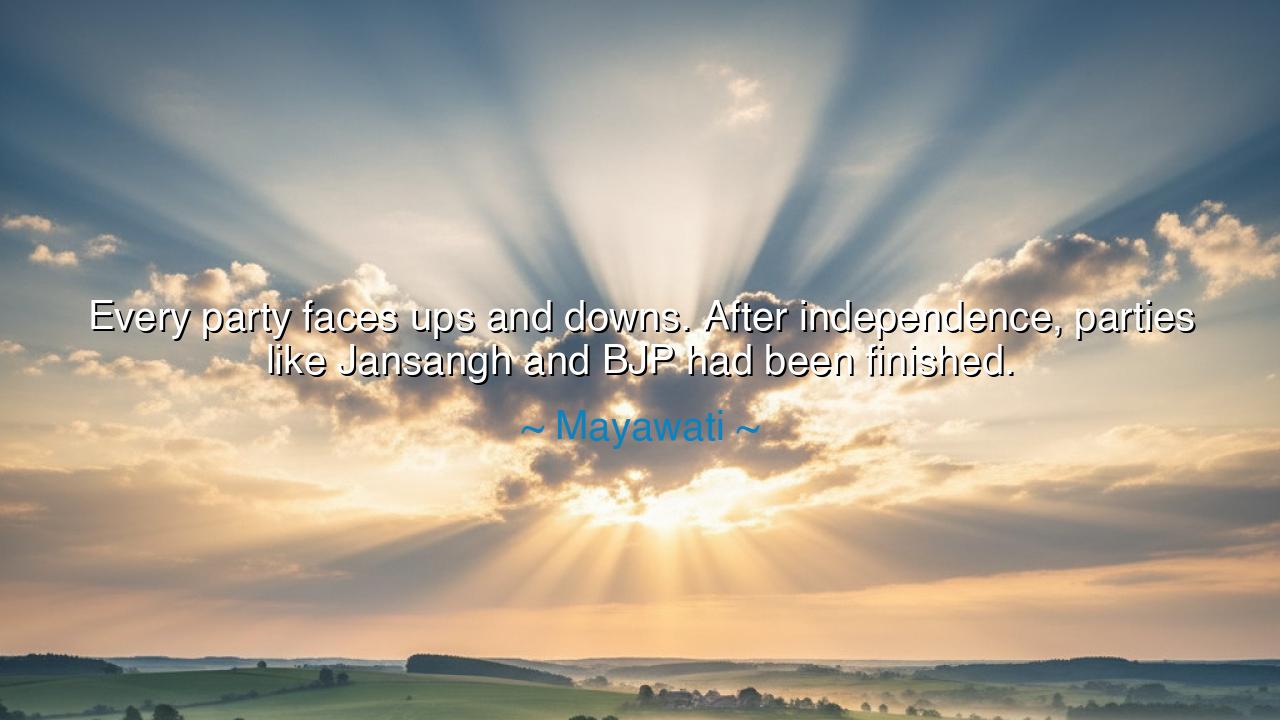
Every party faces ups and downs. After independence, parties like
Every party faces ups and downs. After independence, parties like Jansangh and BJP had been finished.






The formidable leader Mayawati, a figure forged in the fires of struggle and perseverance, once declared with clarity and wisdom: “Every party faces ups and downs. After independence, parties like Jansangh and BJP had been finished.” In these words, she speaks not merely of politics, but of life itself. For the rhythm of history — like the beating of a great heart — moves in cycles of triumph and trial, of rise and fall. No power remains forever unshaken, and no defeat is final. Her words remind us that change is the law of existence, and that endurance, not victory alone, defines greatness.
At the surface, her statement refers to the shifting landscape of Indian politics after independence. In those early decades, the Indian National Congress reigned supreme, its banner carried by those who had led the nation to freedom. Parties like the Jana Sangh, the forerunner of the Bharatiya Janata Party (BJP), seemed lost in the shadow of history — fragmented, dismissed, thought to be extinguished. Yet as Mayawati reminds us, such endings are but the illusions of the moment. For just as the seed must vanish beneath the soil before it can bloom again, so too must every movement pass through obscurity before it rises renewed.
The origin of this wisdom reaches beyond politics into the very essence of human destiny. Empires, dynasties, and parties all share the same fate as men and civilizations — they ascend to glory, falter in arrogance, fall to dust, and rise once more upon the strength of vision and faith. The ancient Greeks saw this as ananke, the divine necessity that binds all things to the wheel of fortune. The Indian sages spoke of it as karma, the unending cycle of action and result. Mayawati, in her pragmatic tone, gives this timeless philosophy a modern voice: no victory is eternal, but neither is any defeat.
Consider the story of the Indian freedom movement itself. After centuries of subjugation, it began as a faint murmur, scattered among dreamers and rebels. The mighty British Empire seemed immovable, unassailable — and yet, through the patient courage of countless souls, it was brought to its knees. The power of the colonizer crumbled, not because it was weak, but because the spirit of those who rose against it was stronger. And yet, after independence, even the party of liberation — the Congress — saw its strength fade, its unity dissolve. The very movement that had once led the people began to falter, while others — once dismissed as irrelevant — rose to prominence. Thus, Mayawati’s words find their proof in history’s own pages: the river of politics never stands still, and those who endure the storms are the ones who adapt and believe.
Her wisdom carries another meaning — that resilience is the soul of leadership. When she says, “Every party faces ups and downs,” she speaks not only to parties but to people. Each human life, like each movement, faces seasons of abundance and drought. The test of strength is not whether we rise high, but whether we rise again after we fall. The Jana Sangh, declared dead by many, was reborn as the BJP, growing from humble beginnings into one of the most powerful political forces in India. So too can each of us transform our own failures into foundations — if we remember that downfall is not destiny.
Mayawati’s own life stands as living proof of her words. Born into hardship, she rose through perseverance to become one of India’s most influential leaders, a symbol of empowerment for those once silenced. She, too, faced defeats, betrayals, and storms — yet she endured, learned, and rose again. Her statement, therefore, is not detached observation, but earned wisdom. She reminds us that the path of power, whether in politics or in life, is not straight or smooth. It winds through valleys and peaks, and only those with patience and faith can walk it to its end.
Let this be the lesson drawn from her declaration: do not despair in decline, nor grow arrogant in ascent. The same tide that lifts the ship may one day lower it, and the same wind that blows against you may tomorrow fill your sails. The wise do not curse the ebb and flow — they steer with it. Just as nations and parties must renew themselves with every generation, so must each of us renew our spirit in the face of struggle.
Thus, Mayawati’s words become not merely political commentary, but a philosophy of endurance: change is inevitable, but defeat is not final. Let us therefore learn from history, from her example, and from the eternal rhythm of rise and fall — that the secret of strength lies not in never falling, but in always rising higher after we do. For the flame that endures the wind burns brighter than one that never knew the storm.






AAdministratorAdministrator
Welcome, honored guests. Please leave a comment, we will respond soon